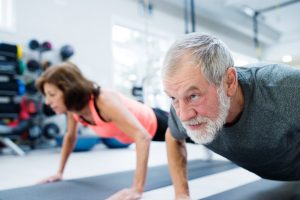
We have many programs to promote eating healthy at LIV Fitness in Dublin, CA. We focus on all ages, including seniors. When you’re older, there are many factors that can prevent getting all the nutrition you need. We help you learn how to overcome those problems and get on the path to a fitter you. More than any other age group, seniors face inadequate nutrition as one of the biggest health issues. It doesn’t matter whether they have access to shopping or adequate funds, getting adequate nutrition is more difficult. In fact, for some seniors, poor nutrition is often mistaken for dementia.
Part of the problem is a social situation.
Seniors are often living alone and making a meal just doesn’t seem worth the effort. Rather than making a meal, they graze on snacks or eat processed meals already made, that have calories, but not nutritional substance. Overcoming this problem is easy. Making meals ahead and freezing them for a later date ensures nutritional needs. It can even cost less with proper meal planning. Using left over veggies and meat to create soups for chilly days is one money saving idea. Bones left from meat can be used to create bone broth that boosts collagen and other nutrients.
As you age, dental issues and digestive issues can create problems eating.
Dental care should be at the top of the list for those who have problems eating healthy. Digestive issues and food intolerance can also add to the difficulty of getting adequate nutrition. You can save money by purchasing in-season fruits and vegetables and cut them into small pieces to help. Smoothies are a great way to get fresh fruits and vegetables into the diet, too. Our nutritional experts can help create a healthy diet and work with food intolerance issues.
One of the biggest nutritional shortages in seniors is vitamin D.
Vitamin D shouldn’t be a problem. After all, exposure to the sun helps you get it. That’s not as true for seniors. During the winter, there’s less access to exposure on large portions of the body. Seniors tend to stay inside more, too. Sun screens have led the way for more deficiencies. While smart sunning is one option, allowing the ultraviolet rays to be converted to vitamin D by the body, that ability is reduced by as much as 70% as people age. Fatigue, bone pain, mood changes, depression, muscle aches, muscle weakness and even muscle cramps can be signs of a vitamin D deficiency.
- Foods higher in vitamin D are salmon, cod liver oil, swordfish, tuna, fortified products like yogurt, milk and orange juice, sardines, liver and egg yolk. Ensuring these are in your diet can increase vitamin D intake.
- Ensuring you have adequate protein, a mix of fruits and vegetables and whole grain products is part of healthy eating. Make sure your fruits and vegetables are a variety of colors, including yellow, red, blue or purple and white.
- If digestive issues are a problem, studies show that regular exercise can help. It aids in moving food through the digestive tract and increases the number of beneficial bacteria that help digest food.
- Often seniors fail to drink enough fluid. The older you get, the faster you dehydrate and the less you notice you’re thirsty. Dehydration can lead to exhaustion, rapid heart rate, muscle weakness and confusion that resembles dementia.
For more information, contact us today at LivFitness 247
